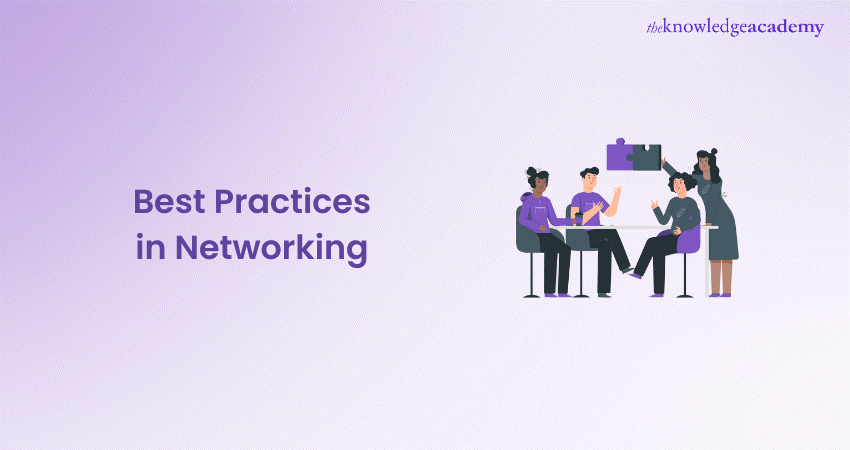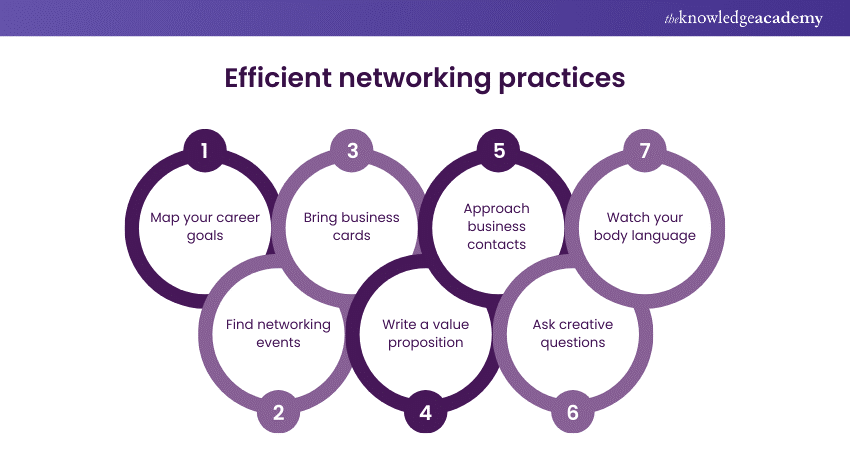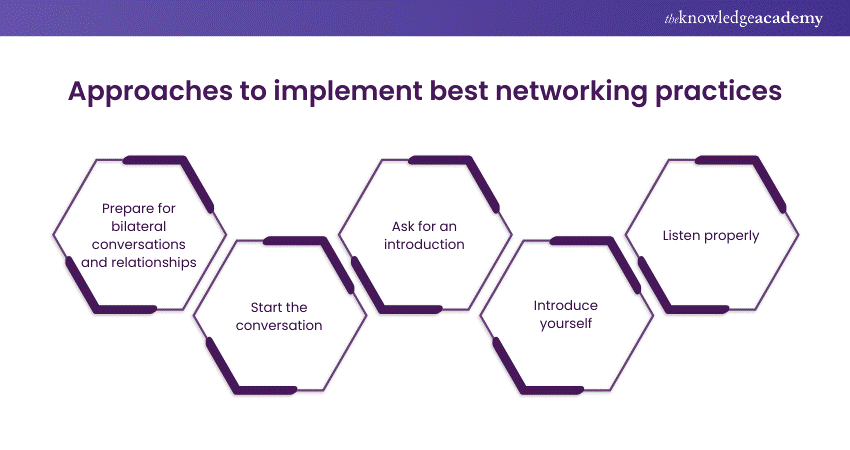We may not have the course you’re looking for. If you enquire or give us a call on + 1-866 272 8822 and speak to our training experts, we may still be able to help with your training requirements.
Training Outcomes Within Your Budget!
We ensure quality, budget-alignment, and timely delivery by our expert instructors.

Networking emerges as a crucial skill for career advancement and success. It aids individuals seeking new job opportunities, aiming to expand their client base, or striving to stay updated on industry trends. However, navigating the Best Practices in Networking domains includes more than just attending events and exchanging business cards.
Consequently, this comprehensive blog aims to equip you with the essential knowledge and tools to build meaningful connections, maximise opportunities, and propel your career forward. From mapping your career goals to perfecting your body language, it will cover multiple essential practices for networking success.
Additionally, it will delve into seven specific networking practices and offer practical tips to effectively implement them. Read more to unlock how the Best Practices in Networking provides a comprehensive overview of networking fundamentals, covering basic principles as well as advanced techniques.
Table of Contents
1) Basics of Best Practices in Networking
2) Importance of Best Practices in Networking
3) 7 Best Practices in Networking
4) How to implement networking best practices?
5) Conclusion
Basics of Best Practices in Networking
Networking can build and maintain relationships for mutual benefit. It mainly involves connecting with people in a relevant industry or field to exchange information, ideas, and opportunities. At its core, it is a fundamental aspect of professional life, often regarded as an art form rather than a mere task.
It revolves around the establishment and upkeep of relationships with individuals within your industry or field. Effective networking might open up new job opportunities, partnerships, and professional growth.
Importance of Best Practices in Networking
By adopting Best Practices in Networking, individuals can maximise every opportunity to expand their network and advance their careers. Here are some key reasons why best networking practices are crucial:
a) Meaningful connections: Networking goes beyond superficial interactions; it's about establishing genuine relationships built on trust and mutual respect.
b) Value addition: Each networking interaction should offer something of value to both parties involved. Whether it's sharing insights, offering assistance, or providing resources, the aim is to contribute positively to the professional relationship.
c) Strategic approach: Best Practices in Networking emphasise a strategic approach rather than random encounters. It involves identifying opportunities where meaningful connections can be made and making the most out of those situations.
d) Network expansion: Effective networking helps in expanding your professional network. They enable you connect with individuals, and gain valuable insights or support in your career journey.
e) Career advancement: By adopting Best Practices in Networking, individuals can leverage their connections to access job opportunities, gain visibility within their industry, and advance their career trajectory.
f) Long-term benefits: Networking isn't just about immediate gains; it's about cultivating relationships that can yield long-term benefits. By nurturing solid connections over time, individuals can tap into a network of support and opportunities throughout their careers.
g) Professional development: Engaging in networking activities allows individuals to keep up with industry trends, best practices, and emerging opportunities. This continuous learning process contributes to ongoing professional development and growth.
Master the strategies to inspire and lead your team to success - join our Successful People Management and Team Leadership Training!
7 Best Practices in Networking
Networking is all about fostering genuine connections and adding value to each interaction. Let's talk about certain Best Practices in Networking that empower you to approach networking with confidence and purpose:

1) Map your career goals
Before diving into networking, take some time to clarify your career goals. Determine what you hope to achieve through networking—whether it's finding a new job, building industry connections, or advancing in your current role. Having clear goals will guide your networking efforts and help you prioritise your activities.
2) Find networking events
Attend industry conferences, seminars, workshops, and networking mixers to meet professionals in your field. Search for events that align with your goals and interests, and make an effort to engage with other attendees. Networking events provide valuable opportunities to connect face-to-face with potential mentors, collaborators, and employers.
3) Bring business cards
Always carry a supply of business cards to networking events. Your business card should include your personal details and a brief description of your expertise or skills. Exchange cards with people you meet to facilitate follow-up communication and maintain professional connections.
4) Write a value proposition
Structure a concise and compelling value proposition that communicates what you bring to the table. Highlight the unique skills, experiences, and accomplishments that set you apart from others in your field. Your value proposition should resonate with potential contacts and demonstrate how you can add value to their professional network.
5) Approach business contacts
Be proactive in initiating conversations with other professionals at networking events. Introduce yourself with confidence, and express genuine interest in learning more about their work and experiences. Networking is about building relationships, so concentrate on developing meaningful connections rather than simply collecting contacts.
6) Ask creative questions
Engage people in conversation by asking thoughtful and open-ended questions. Avoid generic inquiries and, instead, try to spark interesting discussions about industry trends, challenges, or opportunities. Asking creative questions demonstrates your curiosity and initiates deeper connections with your networking contacts.
7) Watch your body language
Pay attention to your body language when networking to convey confidence and approachability. Maintain eye contact, smile, and stand or sit up straight to appear attentive and engaged. Nonverbal cues can significantly impact how others perceive you, so be mindful of your posture and gestures during networking interactions.
Turn into an effective leader with our Leadership Skills Training - register today!
How to implement networking best practices?
You can strengthen your network and increase your chances of long-term success with certain practices. Now, let's explore how to implement networking best practices to maximise your networking efforts:

1) Prepare for bilateral conversations and relationships
Networking is a two-way street, so be prepared to give as much as you receive. Offer support, advice, and resources to your networking contacts, and be willing to help them achieve their goals. Building mutually beneficial relationships strengthens your network and increases the likelihood of long-term success.
2) Start the conversation
Don't wait for others to approach you—take the initiative to start conversations with new people. Approach individuals or groups with a friendly demeanour and introduce yourself with confidence. Starting the conversation demonstrates your proactive approach to networking and sets a positive tone for the interaction.
3) Ask for an introduction
If you're interested in connecting with someone who's already in your network, don't hesitate to ask for an introduction. Reach out to mutual contacts or use professional networking platforms to request introductions to individuals you'd like to meet. Leveraging existing connections can help you expand your network more effectively.
4) Introduce yourself
When introducing yourself to new contacts, be concise and memorable. Clearly state your name, job title, and a brief summary of your professional background or interests. Tailor your introduction to the context of the situation and highlight relevant information that piques the other person's interest.
5) Listen properly
One of the most underrated skills in networking is active listening. Instead of focusing solely on promoting yourself, take the time to listen attentively to what others have to say. Show genuine interest in their perspectives, experiences, and goals, and ask follow-up questions to deepen the conversation. Active listening demonstrates respect and fosters stronger connections with your networking contacts.
Conclusion
By adopting the Best Practices in Networking, you can expand your network, advance your career, and unlock new opportunities for growth and development. Be it attending networking events, engaging with contacts online, or cultivating relationships in your industry, remember to approach each interaction with authenticity, curiosity, and a willingness to add value. With dedication and strategic effort, you can build a robust professional network that supports your goals and aspirations.
Stay ahead of the competition and discover top-notch strategies with our Business Model Innovation Training - sign up now!
Frequently Asked Questions

To enhance body language for networking, practice open posture, maintain eye contact, and smile. Engage in active listening and mirror positive cues.

To appear confident despite nerves, focus on steady breathing, maintain good posture, and visualise success. Remember, confidence can be projected through deliberate body language cues.

The Knowledge Academy takes global learning to new heights, offering over 30,000 online courses across 490+ locations in 220 countries. This expansive reach ensures accessibility and convenience for learners worldwide.
Alongside our diverse Online Course Catalogue, encompassing 17 major categories, we go the extra mile by providing a plethora of free educational Online Resources like News updates, Blogs, videos, webinars, and interview questions. Tailoring learning experiences further, professionals can maximise value with customisable Course Bundles of TKA.

The Knowledge Academy’s Knowledge Pass, a prepaid voucher, adds another layer of flexibility, allowing course bookings over a 12-month period. Join us on a journey where education knows no bounds.

The Knowledge Academy offers various Leadership Courses, including Successful People Management and Leadership Training, Leadership Skills Training, and Business Model Innovation Training. These courses cater to different skill levels, providing comprehensive insights into Managing People Benefits.
Our Business Skills Blogs cover a range of topics related to networking, offering valuable resources, best practices, and industry insights. Whether you are a beginner or looking to advance your Business skills, The Knowledge Academy's diverse courses and informative blogs have got you covered.
Upcoming Business Skills Resources Batches & Dates
Date
 Leadership Skills Training
Leadership Skills Training
Fri 10th Jan 2025
Fri 14th Feb 2025
Fri 11th Apr 2025
Fri 13th Jun 2025
Fri 8th Aug 2025
Fri 26th Sep 2025
Fri 21st Nov 2025







 Top Rated Course
Top Rated Course



 If you wish to make any changes to your course, please
If you wish to make any changes to your course, please


